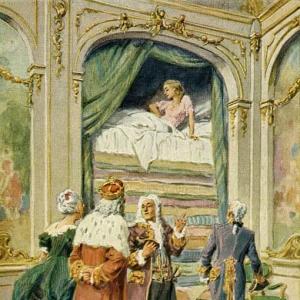Reading time: 14 min
There was once a poor man and a poor woman who had nothing but a little cottage, and who earned their bread by fishing, and always lived from hand to mouth. But it came to pass one day when the man was sitting by the water-side, and casting his net, that he drew out a fish entirely of gold. As he was looking at the fish, full of astonishment, it began to speak and said, „Hark you, fisherman, if you will throw me back again into the water, I will change your little hut into a splendid castle.“ Then the fisherman answered, „Of what use is a castle to me, if I have nothing to eat?“ The gold fish continued, „That shall be taken care of, there will be a cupboard in the castle in which, when you open it, shall be dishes of the most delicate meats, and as many of them as you can desire.“ – „If that be true,“ said the man, „then I can well do you a favour.“ – „Yes,“ said the fish, „there is, however, the condition that you shall disclose to no one in the world, whosoever he may be, whence your good luck has come, if you speak but one single word, all will be over.“ Then the man threw the wonderful fish back again into the water, and went home. But where his hovel had formerly stood, now stood a great castle. He opened wide his eyes, entered, and saw his wife dressed in beautiful clothes, sitting in a splendid room, and she was quite delighted, and said, „Husband, how has all this come to pass? It suits me very well.“ – „Yes,“ said the man, „it suits me too, but I am frightfully hungry, just give me something to eat.“ Said the wife, „But I have got nothing and don’t know where to find anything in this new house.“ – „There is no need of your knowing,“ said the man, „for I see yonder a great cupboard, just unlock it.“ When she opened it, there stood cakes, meat, fruit, wine, quite a bright prospect. Then the woman cried joyfully, „What more can you want, my dear?“ and they sat down, and ate and drank together.
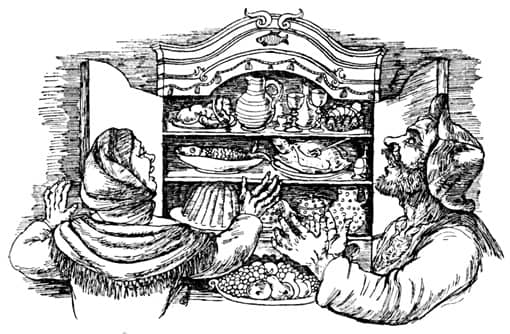
When they had had enough, the woman said, „But husband, whence come all these riches?“ – „Alas,“ answered he, „do not question me about it, for I dare not tell you anything. If I disclose it to any one, then all our good fortune will fly.“ – „Very good,“ said she, „if I am not to know anything, then I do not want to know anything.“ However, she was not in earnest. She never rested day or night, and she goaded her husband until in his impatience he revealed that all was owing to a wonderful golden fish which he had caught, and to which in return he had given its liberty. And as soon as the secret was out, the splendid castle with the cupboard immediately disappeared, they were once more in the old fisherman’s hut, and the man was obliged to follow his former trade and fish. But fortune would so have it, that he once more drew out the golden fish. „Listen,“ said the fish, „if you will throw me back into the water again, I will once more give you the castle with the cupboard full of roast and boiled meats; only be firm, for your life’s sake don’t reveal from whom you have it, or you will lose it all again!“ – „I will take good care,“ answered the fisherman, and threw the fish back into the water. Now at home everything was once more in its former magnificence, and the wife was overjoyed at their good fortune, but curiosity left her no peace, so that after a couple of days she began to ask again how it had come to pass, and how he had managed to secure it. The man kept silence for a short time, but at last she made him so angry that he broke out, and betrayed the secret. In an instant the castle disappeared, and they were back again in their old hut. „Now you have got what you want,“ said he. „And we can gnaw at a bare bone again.“ – „Ah,“ said the woman, „I had rather not have riches if I am not to know from whom they come, for then I have no peace.“
The man went back to fish, and after a while he chanced to draw out the gold fish for a third time. „Listen,“ said the fish, „I see very well that I am fated to fall into your hands, take me home and cut me into six pieces; give your wife two of them to eat, two to your horse and bury two of them in the ground, then they will bring you a blessing.“ The fisherman took the fish home with him, and did as it had bidden him. It came to pass, however, that from the two pieces that were buried in the ground two golden lilies sprang up, that the horse had two golden foals, and the fisherman’s wife bore two children who were made entirely of gold.
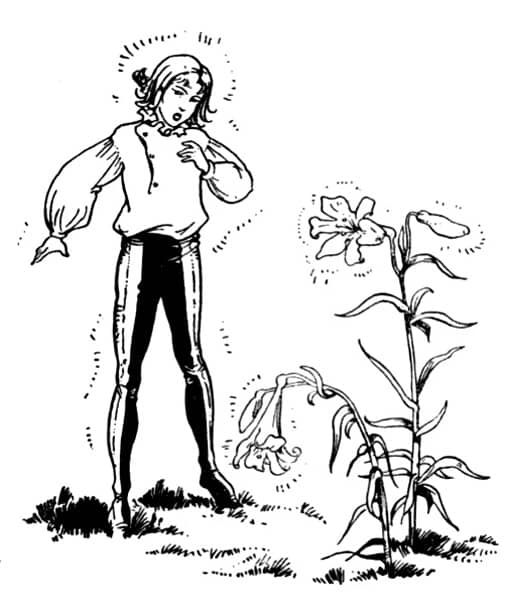
The children grew up, became tall and handsome, and the lilies and horses grew likewise. Then they said, „Father, we want to mount our golden steeds and travel out in the world.“ But he answered sorrowfully, „How shall I bear it if you go away, and I know not how it fares with you?“ Then they said, „The two golden lilies remain here. By them you can see how it is with us. If they are fresh, then we are in health. If they are withered, we are ill. If they perish, then we are dead.“ So they rode forth and came to an inn, in which were many people, and when they perceived the gold-children they began to laugh, and jeer. When one of them heard the mocking he felt ashamed and would not go out into the world, but turned back and went home again to his father. But the other rode forward and reached a great forest. As he was about to enter it, the people said, It is not safe for you to ride through, the wood is full of robbers who would treat you badly. You will fare ill, and when they see that you are all of gold, and your horse likewise, they will assuredly kill you.
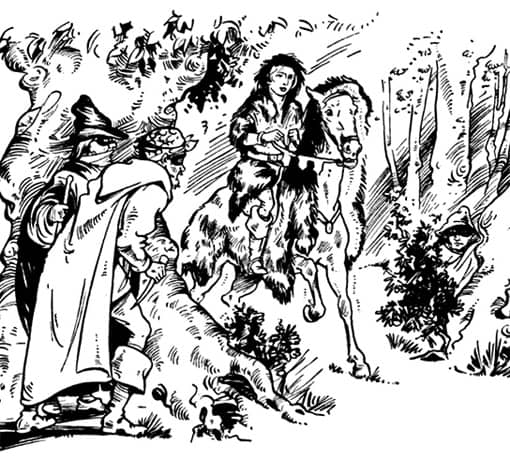
‚
But he would not allow himself to be frightened, and said, „I must and will ride through it.“ Then he took bear-skins and covered himself and his horse with them, so that the gold was no more to be seen, and rode fearlessly into the forest. When he had ridden onward a little he heard a rustling in the bushes, and heard voices speaking together. From one side came cries of, „There is one,“ but from the other, „Let him go, ‚tis an idle fellow, as poor and bare as a church-mouse, what should we gain from him?“
So the gold-child rode joyfully through the forest, and no evil befell him. One day he entered a village wherein he saw a maiden, who was so beautiful that he did not believe that any more beautiful than she existed in the world. And as such a mighty love took possession of him, he went up to her and said, „I love thee with my whole heart, wilt thou be my wife?“ He, too, pleased the maiden so much that she agreed and said, „Yes, I will be thy wife, and be true to thee my whole life long.“ Then they were married, and just as they were in the greatest happiness, home came the father of the bride, and when he saw that his daughter’s wedding was being celebrated, he was astonished, and said, „Where is the bridegroom?“ They showed him the gold-child, who, however, still wore his bear-skins. Then the father said wrathfully, „A vagabond shall never have my daughter!“ and was about to kill him. Then the bride begged as hard as she could, and said, „He is my husband, and I love him with all my heart!“ until at last he allowed himself to be appeased. Nevertheless the idea never left his thoughts, so that next morning he rose early, wishing to see whether his daughter’s husband was a common ragged beggar. But when he peeped in, he saw a magnificent golden man in the bed, and the cast-off bear-skins lying on the ground. Then he went back and thought, „What a good thing it was that I restrained my anger! I should have committed a great crime.“ But the gold-child dreamed that he rode out to hunt a splendid stag, and when he awoke in the morning, he said to his wife, „I must go out hunting.“ She was uneasy, and begged him to stay there, and said, „You might easily meet with a great misfortune,“ but he answered, „I must and will go.“
Thereupon he got up, and rode forth into the forest, and it was not long before a fine stag crossed his path exactly according to his dream. He aimed and was about to shoot it, when the stag ran away. He gave chase over hedges and ditches for the whole day without feeling tired, but in the evening the stag vanished from his sight, and when the gold-child looked round him, he was standing before a little house, wherein was a witch. He knocked, and a little old woman came out and asked, „What are you doing so late in the midst of the great forest?“ – „Have you not seen a stag?“ – „Yes,“ answered she, „I know the stag well,“ and thereupon a little dog which had come out of the house with her, barked at the man violently. „Wilt thou be silent, thou odious toad,“ said he, „or I will shoot thee dead.“ Then the witch cried out in a passion, „What! will you slay my little dog?“ and immediately transformed him, so that he lay like a stone, and his bride awaited him in vain and thought, „That which I so greatly dreaded, which lay so heavily on my heart, has come upon him!“ But at home the other brother was standing by the gold-lilies, when one of them suddenly drooped. „Good heavens!“ said he, „my brother has met with some great misfortune! I must away to see if I can possibly rescue him.“ Then the father said, „Stay here, if I lose you also, what shall I do?“ But he answered, „I must and will go forth!“
Then he mounted his golden horse, and rode forth and entered the great forest, where his brother lay turned to stone. The old witch came out of her house and called him, wishing to entrap him also, but he did not go near her, and said, „I will shoot you, if you will not bring my brother to life again.“ She touched the stone, though very unwillingly, with her forefinger, and he was immediately restored to his human shape. But the two gold-children rejoiced when they saw each other again, kissed and caressed each other, and rode away together out of the forest, the one home to his bride, and the other to his father. The father then said, „I knew well that you had rescued your brother, for the golden lily suddenly rose up and blossomed out again.“ Then they lived happily, and all prospered with them until their death.
 Learn languages. Double-tap on a word.Learn languages in context with Childstories.org and Deepl.com.
Learn languages. Double-tap on a word.Learn languages in context with Childstories.org and Deepl.com.Backgrounds
Interpretations
Adaptions
Summary
Linguistics
„The Gold-Children“ is a lesser-known fairy tale by the Brothers Grimm, collected in their famous anthology „Grimms‘ Fairy Tales“ (originally titled „Children’s and Household Tales“ or „Kinder- und Hausmärchen“). The Brothers Grimm, Jacob and Wilhelm, were German academics, linguists, cultural researchers, and authors who collected and published folk tales during the 19th century. Their work has had a significant impact on the study of folklore and the popularization of fairy tales across the world.
The tales they collected were primarily oral stories passed down through generations within German-speaking regions. The Brothers Grimm sought to preserve these stories as part of German cultural heritage, and they transcribed them into written form, often modifying and adapting them to better suit literary audiences. Their collection of stories includes some of the most famous fairy tales known today, such as „Cinderella,“ „Snow White,“ „Rapunzel,“ and „Hansel and Gretel.“
„The Gold-Children,“ while not as well-known as some of the other tales in the Grimms‘ collection, shares many themes and motifs with other fairy tales, such as transformation, magical assistance, tests of character, and the triumph of good over evil. The story is part of the rich tapestry of folklore that the Brothers Grimm contributed to preserving and popularizing, showcasing the cultural imagination and wisdom of the German-speaking communities from which the stories were drawn.
„The Gold-Children“ can be interpreted in various ways, offering valuable lessons and insights:
The dangers of greed and curiosity: The story highlights the potential dangers of greed and excessive curiosity. The fisherman’s wife’s inability to remain content with their newfound wealth and her constant questioning eventually lead to their downfall. This serves as a reminder to appreciate the blessings one has without seeking to know everything or desiring more.
The power of second chances: The fisherman is given multiple opportunities to learn from his mistakes and maintain the secret of the gold fish. This aspect of the story suggests that people can change and improve when given a chance to learn from their past actions.
Family bonds and loyalty: The story emphasizes the importance of family ties and loyalty. The brothers‘ love and concern for each other drive them to support and rescue one another. Their father, too, remains concerned for their well-being and provides guidance and comfort throughout their lives.
The transformative power of love: The gold-child’s love for the beautiful maiden is so strong that it leads him to overcome numerous obstacles and eventually create a happy life together. This theme showcases the power of love to inspire and strengthen individuals during difficult times.
The importance of inner strength and determination: Both gold-children display resilience and determination in facing challenges, such as mockery and magical threats. These qualities ultimately lead to their successful reunification and a happy ending, underscoring the importance of perseverance and courage in overcoming adversity.
The consequences of breaking promises: The fisherman breaks his promise to the gold fish twice, resulting in the loss of their wealth and happiness. This aspect of the story serves as a reminder of the importance of keeping one’s word and honoring commitments.
Overall, „The Gold-Children“ offers a variety of interpretations and lessons that touch upon themes of family, loyalty, love, determination, and the consequences of greed and broken promises.
„The Gold-Children“ is a lesser-known fairy tale from the Brothers Grimm, and as such, it has not been adapted as frequently as some of their more well-known stories. However, there have been a few adaptations of the tale over the years. Here are a few examples.
„The Golden Bird“ (animated short film, 1953): This Disney animated short film is based on the Grimm Brothers‘ story „The Golden Bird,“ which shares many similarities with „The Gold-Children.“ In this version, a prince must capture a golden bird from a magical tree to win the hand of a princess.
„The Golden Goose“ (film, 1964): This British film is an adaptation of the Grimm Brothers‘ story „The Golden Goose,“ which also features a magical golden object. In this version, a simpleton must find a golden goose to win the heart of a princess.
„The Gold-Children“ (children’s book, 2001): This children’s book by Jan Pieńkowski is a retelling of the Grimm Brothers‘ story. It features Pieńkowski’s distinctive silhouette illustrations and is aimed at young readers.
„The Gold-Children“ (podcast episode, 2016): This episode of the „Myths and Legends“ podcast tells the story of „The Gold-Children“ in a modern, conversational style. The podcast explores the themes and interpretations of the tale and adds a few humorous touches.
While „The Gold-Children“ has not been adapted as frequently as some of the Grimm Brothers‘ other stories, its themes of greed, sacrifice, and hard work continue to resonate with audiences today.
„The Gold-Children“ is a Brothers Grimm fairy tale about a poor fisherman and his wife who are granted a life of riches by a magical gold fish, under the condition that they never reveal the source of their good fortune. The fisherman agrees, and they are given a splendid castle and a cupboard that provides an endless supply of delicious food. However, the fisherman’s wife becomes consumed by curiosity and eventually pesters her husband into revealing the secret. As a result, their wealth vanishes, and they return to their humble lives.
One day, the fisherman catches the gold fish again, who offers to restore their riches on the same condition. However, his wife’s curiosity gets the better of her again, and they lose everything once more. On the third encounter, the gold fish instructs the fisherman to cut it into six pieces, giving two to his wife, two to his horse, and burying the remaining two. This leads to the birth of two golden children and the growth of two golden lilies and two golden foals.
The golden children grow up and decide to explore the world, promising their father they will keep track of their well-being through the golden lilies. One of the brothers turns back due to mockery, while the other continues on, eventually marrying a beautiful maiden. However, his father-in-law initially disapproves of him, thinking he is a vagabond. After discovering the truth, the father-in-law relents, but the gold-child’s adventures lead him to be turned to stone by a witch.
The other brother sets out to rescue his sibling, and upon finding him, threatens the witch to turn his brother back to human form. Once reunited, they return to their respective homes, and the family lives happily ever after.
A linguistic analysis of „The Gold-Children“ by the Brothers Grimm highlights several key features characteristic of fairy tales and their narrative style. This analysis explores the use of language, structure, and thematic elements in the tale.
Language and Style
Simple and Direct Language: The language in „The Gold-Children“ is straightforward and accessible, typical of oral storytelling traditions. This makes the narrative easy to follow for listeners of all ages, maintaining the timeless appeal of fairy tales.
Use of Dialogue: Dialogue plays a crucial role in advancing the plot and revealing character intentions. For example, the interaction between the fisherman and the gold fish sets the story’s magical premise. Dialogue is often direct, reflecting the simple moral lessons imparted by the tale.
Repetition: The story employs repetition, a common device in fairy tales, to emphasize key plot points and ensure retention. The fisherman’s repeated encounters with the gold fish reinforce the idea of second chances and the consequences of human weaknesses, like curiosity.
Formulaic Expressions: Phrases such as “Hark you” or “What more can you want” are reminiscent of formulaic structures used in oral storytelling, serving to engage the audience and create a rhythmic narrative flow.
Structure
Traditional Fairy Tale Structure
The story follows a classic fairy tale structure: introduction of a problem, magical intervention, series of tests or challenges, and eventually, a resolution. This structure helps convey the story’s moral lessons.
Triadic Elements: The narrative unfolds in a tripartite manner, with the fisherman encountering the fish thrice and being given instructions involving three sets of two: two pieces for his wife, his horse, and to bury. The number three is significant in fairy tales for its mnemonic and symbolic value.
Themes and Motifs
Greed and Curiosity: Central themes include the dangers of greed and insatiable curiosity. The wife’s inability to resist questioning leads to the loss of their riches, illustrating the moral that ignorance can at times be more beneficial.
Transformation: Metamorphosis is a recurring motif, with the fish transforming into source of wealth, children of gold being born, and individuals being turned into stone. These transformations symbolize change, growth, or regression tied to characters’ virtues and vices.
Tests and Trials: Characters are repeatedly tested, mainly through the temptations of revealing secrets or pursuing desires. These serve to measure the characters‘ resolve and ethical standing, typical of morality tales within fairy tales.
Symbolism of Gold: Gold, commonly symbolizing wealth and value, in this tale also represents purity and uniqueness, particularly seen in the golden children and lilies that serve as indicators of the protagonists’ well-being.
Cultural and Moral Implications
– The story reflects cultural values such as modesty, the importance of keeping promises, and the virtue of contentment. Fairy tales often use fantastical elements to teach moral lessons, and this narrative is no exception, using the magical gold fish to explore human failings and the possibility of redemption.
Overall, „The Gold-Children“ employs traditional fairy tale elements in language and structure to convey timeless moral lessons. The linguistic simplicity, coupled with strategic use of dialogue and repetition, underscores the narrative’s focus on the consequences of human behavior and the power of redemption.
Information for scientific analysis
Fairy tale statistics | Value |
|---|---|
| Number | KHM 85 |
| Aarne-Thompson-Uther-Index | ATU Typ 555 |
| Translations | DE, EN, DA, ES, FR, PT, IT, JA, NL, PL, RU, TR, VI, ZH |
| Readability Index by Björnsson | 31.3 |
| Flesch-Reading-Ease Index | 80.2 |
| Flesch–Kincaid Grade-Level | 7.3 |
| Gunning Fog Index | 10.1 |
| Coleman–Liau Index | 7.4 |
| SMOG Index | 8.8 |
| Automated Readability Index | 7.6 |
| Character Count | 10.063 |
| Letter Count | 7.657 |
| Sentence Count | 93 |
| Word Count | 1.942 |
| Average Words per Sentence | 20,88 |
| Words with more than 6 letters | 202 |
| Percentage of long words | 10.4% |
| Number of Syllables | 2.420 |
| Average Syllables per Word | 1,25 |
| Words with three Syllables | 87 |
| Percentage Words with three Syllables | 4.5% |
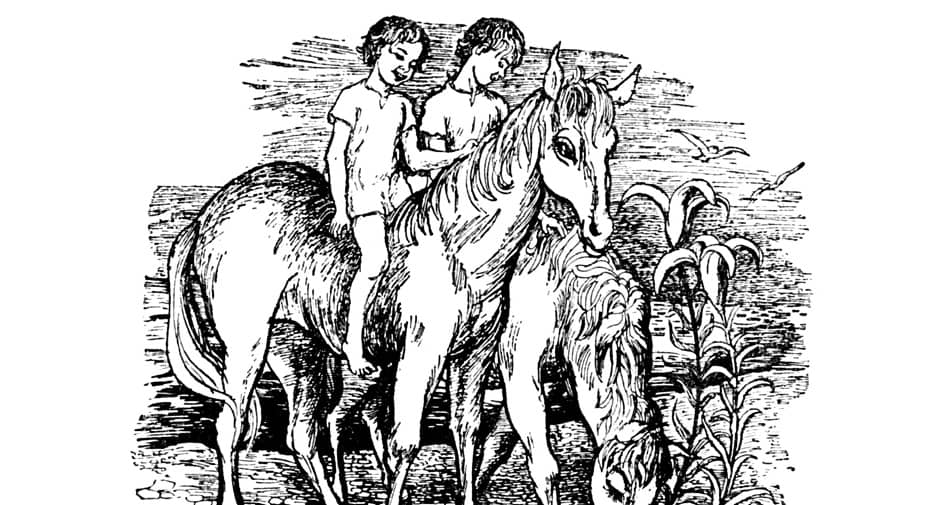
 Facebook
Facebook  Whatsapp
Whatsapp  Messenger
Messenger  Telegram
Telegram Reddit
Reddit